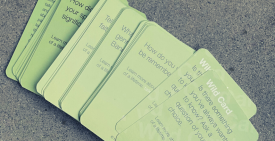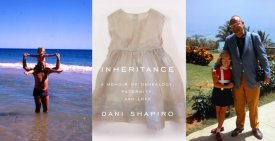 Facebook is not the most intimate way to share news of a loved one’s death. But it is, perhaps, the most expedient. A quick post and all of a sudden 1,500 of your closest friends (and professional contacts and ex-boyfriends and elementary school pals whom you haven’t seen since you moved away in the third grade) know what happened, when the funeral is and where memorial donations can be directed. That was easy — and hard.
Facebook is not the most intimate way to share news of a loved one’s death. But it is, perhaps, the most expedient. A quick post and all of a sudden 1,500 of your closest friends (and professional contacts and ex-boyfriends and elementary school pals whom you haven’t seen since you moved away in the third grade) know what happened, when the funeral is and where memorial donations can be directed. That was easy — and hard.
In a new piece in The Atlantic, “How We Grieve on Social Media,” Joshua Andrew looks the rise of Facebook death notices — and discusses their impact on the mourner and observer alike. For the grief-stricken, he contends, “Focus shifts from a desire for an endorsement to a desire for support. Tragedy invites us to lay aside the ‘I’ of social media and embrace the ‘we.’”
And that very briefly brings out the better angels in those who happen upon the post in their News Feed. Andrew writes:
Suddenly, an online space typically reserved for jokes and self-promotion is soaked in the earnest rhetoric of condolence and spirituality as people request prayers and thoughts. The transition feels strange and almost inappropriate. The easy snark and sarcasm that dominates comment-section discussion is replaced by promises of remembrance, but only for a moment, as presumably, the well-wishers then return to their regularly scheduled social media programming.
However out of place Facebook condolences seem, those passing well wishes may well provide a modicum of comfort to mourners, the piece notes — given the sheer number of people who, in the absence of knowing what to say or do, may have said or done nothing at all. Here, Andrew quotes Garry Hare, a media psychology professor:
In the old days, you had to go knock on your neighbor’s door when something was wrong. … But not very many of us did it because we didn’t know what to say. We were just not equipped. You could send them soup. You can send them a note. Now, the distance provided by social media is extraordinarily safer and that doesn’t make it less meaningful.
Grieving in the age of Facebook is an issue that we at Modern Loss have thought a lot about. Just today, we have a piece by Amanda MacGregor about how news of her father’s death spread on Facebook, even before his next of kin had been notified of his fatal accident. Back in February, Jennifer Richler argued that social media is making people lazy in the face of grief — and made a case for a return to old-fashioned condolence notes. And our advice columnist, Meg Tansey, has weighed in on just how to respond appropriately to Facebook death posts. I recommend reading all of Meg’s sage advice on the topic, but here’s a snippet:
My first rule of grief is that the worst thing you can do is nothing. So at the risk of horrifying both grandmothers and etiquette experts everywhere, I think you are correct that if someone posts about a loss in their life on Facebook, you are not in the wrong to respond on Facebook. There are two main reasons for this, one: I generally feel that you should follow the grieving person’s lead as much as possible (i.e. talk about the person if they want to talk about the person/don’t if they don’t). Two is that I think a medium like Facebook can be a great way to provide someone with a much-needed real-time jolt of sympathy and community.
Lastly, here’s a 2012 blog post I wrote about my own positive experience with “internet empathy,” on the anniversary of my father’s and stepmother’s deaths. While I acknowledged that a few facile words Facebook aren’t enough (on the part of those attempting to provide comfort), hey, they’re not nothing either. Here’s an excerpt:
Hearing that you are in someone’s thoughts and prayers or that your loved ones made a difference can go a long way to reducing the isolation that so many sick and grieving people endure.
Words can be powerful. I take comfort in all of the warm notes on my Facebook timeline, in much the same way that I took comfort in all the handwritten notes and condolence cards I received eight years ago.
Moreover, words can inspire meaningful action.
When I lost my father and stepmother many, many people showed up for the funeral and the shiva. A year on, though, only a handful of those people would remember the somber anniversary.
And that’s okay. Life is busy. People have their own somber anniversaries that not everyone who sent a sympathy card or made a shiva call can be expected to remember. That doesn’t mean that they don’t care or that, if reminded (on Facebook, say), they won’t cook for you or accompany you to shul. Yesterday, my own little note on Facebook yielded dinner invitations and charitable donations in my father’s memory.
For the sentiments expressed, and for the actions they inspired, I am thankful.








